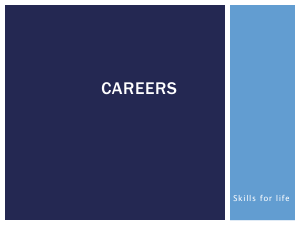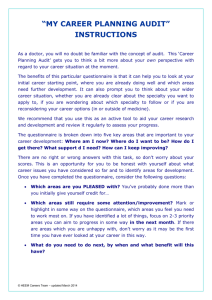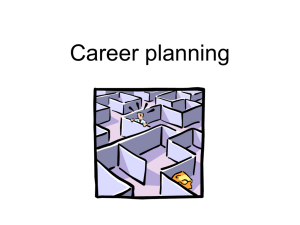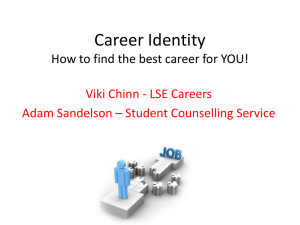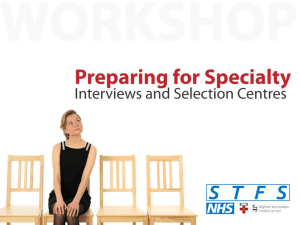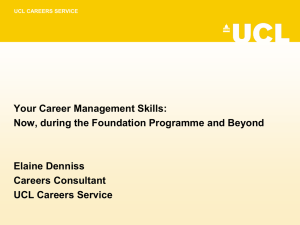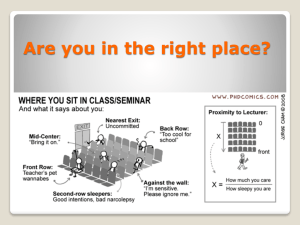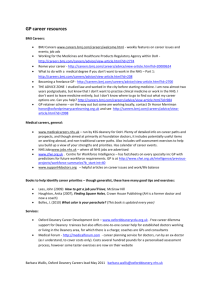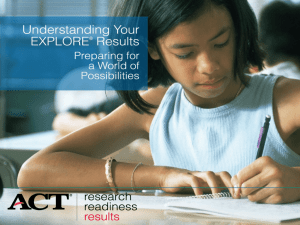Career exploration
advertisement
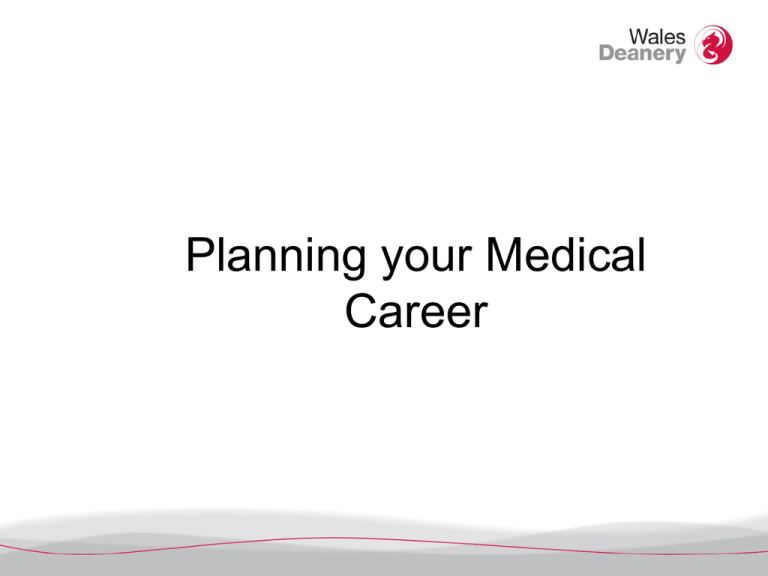
Planning your Medical Career Learning outcomes - you will: • • • • • Understand a range of career options open to you after Foundation Training Be more familiar with the career path to and through Specialty Training Recognise the importance of early career planning and adopt a four-stage approach Carry out a self-assessment of your career values and preferences in order to inform future decisions Be able to access a range of career information resources and know where to go for help Deanery Careers Team • Dr Melanie Jones Associate Dean and Careers/LTFT Lead • Sally Blake Career Development Adviser pgmedicalcareers@cardiff.ac.uk Who we support: • Doctors during Foundation, during Speciality Training and some beyond • This means you! Career Support for Trainees Self review Deanery Assoc Deans Career Adviser Performance, ISP Advanced Local Support PGO, FPD, TPD, Mentors, School, Occ health Local info / support Ed sup, college tutor, PGCM The first two tiers show who is involved in providing local support Why bother about career planning? • From 2010 career management has more focus in Foundation Curriculum and portfolio • Earlier decisions or positioning now needed • Everyone needs to be prepared for uncertainty, compromise and change (in any career) • Careers don’t “just happen”- you live with your choices • NHS workforce needs drive opportunity, not personal dreams Your career at its simplest… 1. 2. 3. 4. Go to Medical School Become a Junior Doctor Enter specialty training Become a consultant The reality… Interactive Career map From hot button on Deanery homepage www.walesdeanery.org Main Options after F2 • • • • • • Specialty Training programme Integrated Academic Training (WCAT) Specialty doctor Time Out/Abroad Research/teaching Other use of medical training (law, finance, informatics, sales, health related) Speciality Training “Uncoupled” Core Training (2-3 years) • Surgery • Medicine • Anaesthetics • Psychiatry • ACCS – 3 years core then on to Anaes, Em. Med or acute medical Then apply for ST3 Direct entry “Runthrough” specialities • General Practice • Clinical Radiology • O+G • Paediatrics • Ophthalmology • Histopathology • Microbiology inc Virology • Chemical Pathology • Public Health Speciality Choices • Early years core training is generic, with transferable competencies • Some junior doctors know exactly which speciality they wish to enter, others want to keep options open – it works either way • Some will put location before specialty, others vice-versa • Most medical graduates are pluri-potential and will adapt well to a range of options Four Stages of Career Planning 1. Self assessment (Patient history) 2. Career Exploration (Examination) 3. Decision making (Diagnosis) 4. Plan implementation (Treatment plan) • Is your goal Realistic? • Have you considered all Opportunities? • Have you built in the Anchors that will provide personal support in the background to your career? • Will your choice Develop your potential? • Can you work with or minimise the Stress factors in your career choice? Four stages explained: Now: • Self assessment Exploring career values, motivators, preferences, personal strengths, limitations • Career exploration Establishing options, alternatives and plan B’s, information gathering, networking, reality checking Next: • Decision making Evaluating options, mapping skills and attributes against actual roles, considering options and preferences, clarifying personal factors, making choices • Plan implementation Applicant research, CV update and applications, preparing for assessments and interviews Exercise 1 • Sort cards under the 4 headings • No more than 8 “very important" cards Then discuss with your colleagues: • Any surprises? • How similar or different are your preferences from those of each other? • Any which might be more or less important in 10 years time? • Will you find outlet for all the v important in your current career choices? Other Self-assessment tools Specific to medical careers – SCI59 • • • • On line self assessment tool http://www.bma.org.uk/careers Improves self awareness if questions considered. Take it with a pinch of salt – hazard warning!!! Free to BMA members via their website More general self-assessment tools: www.teamtechnology.co.uk ; MBTI-style and team style www.windmillsonline.co.uk ; assessing career values and interests www.prospects.ac.uk ; Prospects Planner for graduate careers What do I need to know? • • • • • • • • • Skills and competencies required Qualifications and training needed Experience needed at each point of entry Pathways and progression Competition ratios Number and type of posts Local and UK variation Must be up to date – things change! See www.medicalcareers.nhs.uk How to explore • You can organise “tasters” in F2 to look at specialties you may consider or want to find out about • Go to national or local medical careers fairs (BMJ) • For events in Wales see Deanery careers pages http://www.cardiff.ac.uk/walesdeanery/careers l • Talk to trainees – what did they choose, why? Useful websites • www.mmc.nhs.uk : person specifications and specialty recruitment information • www.medicalcareers.nhs.uk : national career support resource, includes specialty information and workforce projections • careerfocus.bmj.com/ : details of UK and other job vacancies, career advice, FAQ • www.gprecruitment.org.uk/ for GP training information Careers in Wales • www.walesdeanery.org : for info on PG training and employment in Wales and career support information • www.doctorstrainingwales.tv : for video clips on specialty training in Wales • www.medicalcareerswales.com : quick links to Local Health Boards and current NHS vacancy information in Wales Deanery On Line Resources • • • • E Learning module on PLATO Interactive map and app E-guidance link Career planning pages www.doctorstrainingwales.tv Next Steps • Self assessment - try Sci 59 and other profiling tools • Get CV in shape for F2 applications • F2 applications – exploring options or reinforcing early ideas? • Research and explore specialties of interest • Think ahead to possible F2 tasters • Think about tactical use of study leave • Build portfolio – record career reflections • Bookmark sources of information

